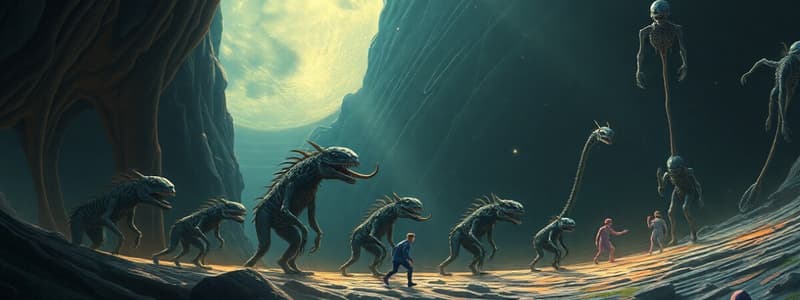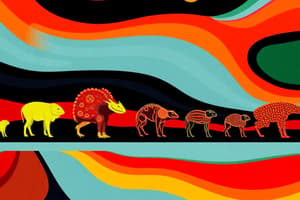Podcast
Questions and Answers
During which era were gymnosperms dominant?
During which era were gymnosperms dominant?
- Mesozoic Era (correct)
- Precambrian Era
- Cenozoic Era
- Paleozoic Era
What significant evolutionary development is associated with red algae?
What significant evolutionary development is associated with red algae?
- Initiation of sexual reproduction (correct)
- Transition to multicellularity
- Formation of hard shells
- Invention of photosynthesis
What were trilobites known to do for self-protection?
What were trilobites known to do for self-protection?
- Secrete toxins
- Change color
- Curl up into balls (correct)
- Burrow into the sand
Which of the following characteristics did trilobites possess?
Which of the following characteristics did trilobites possess?
What was the primary diet of Anomalocaris?
What was the primary diet of Anomalocaris?
What size could Anomalocaris grow up to?
What size could Anomalocaris grow up to?
For how long did trilobites exist as a dominant species?
For how long did trilobites exist as a dominant species?
What significant evolutionary feature is associated with the ferns?
What significant evolutionary feature is associated with the ferns?
Which event marked the major diversification of plants and animals?
Which event marked the major diversification of plants and animals?
What do cyanobacteria primarily use for their metabolic processes?
What do cyanobacteria primarily use for their metabolic processes?
Which eon witnessed the first life forms emerging?
Which eon witnessed the first life forms emerging?
During which period did the extinction of dinosaurs occur?
During which period did the extinction of dinosaurs occur?
What significant evolutionary development occurred around 1.85 billion years ago?
What significant evolutionary development occurred around 1.85 billion years ago?
Which eon is characterized by well-displayed life forms?
Which eon is characterized by well-displayed life forms?
What leads to a significant increase in species diversity during the Cambrian explosion?
What leads to a significant increase in species diversity during the Cambrian explosion?
What type of organisms are most prokaryotes, including cyanobacteria?
What type of organisms are most prokaryotes, including cyanobacteria?
What role do spores play in plant reproduction?
What role do spores play in plant reproduction?
What significant development occurred in Earth's atmosphere that made land a safer ecosystem?
What significant development occurred in Earth's atmosphere that made land a safer ecosystem?
Which animal is considered one of the earliest known tetrapods?
Which animal is considered one of the earliest known tetrapods?
During which geological period did Acanthostega emerge?
During which geological period did Acanthostega emerge?
What event is known for the diversification of most modern animals and plants?
What event is known for the diversification of most modern animals and plants?
What type of organism was Acanthostega considered to be a missing link between?
What type of organism was Acanthostega considered to be a missing link between?
Which of the following statements about primitive Earth is true?
Which of the following statements about primitive Earth is true?
How many years ago did the Earth form?
How many years ago did the Earth form?
Flashcards
Earliest Life on Earth
Earliest Life on Earth
Life first appeared approximately 3.7 billion years ago.
Hydrothermal Vents
Hydrothermal Vents
Possible sources for early life, located deep in the ocean.
Photosynthetic Organisms
Photosynthetic Organisms
Organisms that use sunlight to make food.
Eukaryotes
Eukaryotes
Signup and view all the flashcards
Cambrian Explosion
Cambrian Explosion
Signup and view all the flashcards
Hadean Eon
Hadean Eon
Signup and view all the flashcards
Archean Eon
Archean Eon
Signup and view all the flashcards
Proterozoic Eon
Proterozoic Eon
Signup and view all the flashcards
Phanerozoic Eon
Phanerozoic Eon
Signup and view all the flashcards
Paleozoic Era
Paleozoic Era
Signup and view all the flashcards
Mesozoic Era
Mesozoic Era
Signup and view all the flashcards
Cenozoic Era
Cenozoic Era
Signup and view all the flashcards
Cyanobacteria
Cyanobacteria
Signup and view all the flashcards
Gymnosperms
Gymnosperms
Signup and view all the flashcards
Red Algae
Red Algae
Signup and view all the flashcards
Trilobites
Trilobites
Signup and view all the flashcards
Anomalocaris
Anomalocaris
Signup and view all the flashcards
Ferns
Ferns
Signup and view all the flashcards
Land Animals
Land Animals
Signup and view all the flashcards
Acanthostega
Acanthostega
Signup and view all the flashcards
Study Notes
Early Forms of Life
- Earth was formed about 4.5 billion years ago, and the earliest life appeared 3.7 billion years ago
- Hydrothermal vents are a possible source of early life
- The earliest life forms were microbes
Timeline of Life
- 3.5 billion years ago (bya): Photosynthetic organisms evolved
- 1.85 bya: Eukaryotes emerged
- 525 mya: Cambrian explosion, a period of rapid diversification of life
4 Eons of Evolution
- Hadean Eon: Period of young Earth and earliest possible life
- Archean Eon: Rock and soil formation, rise of photosynthetic bacteria, and oxygen in the atmosphere
- Proterozoic Eon: Evolution of eukaryotes and multicellular organisms, beginning of animal evolution
- Phanerozoic Eon: Period of well-displayed life
3 Eras of the Phanerozoic Eon
- Paleozoic Era: Major diversification of plants and animals
- Mesozoic Era: Jurassic Period, great diversity of plants and animals, dinosaur extinction
- Cenozoic Era: Evolution of primates, increased diversity of organisms, extinction of primitive plants and animals, ice age
Cyanobacteria
- Prokaryotic organisms that lack nuclei
- Photosynthetic
- Unicellular
- Can form blooms
Gymnosperms
- Dominant during the Mesozoic Era (252.2 million to 66 million years ago)
- Were displaced by angiosperms during the Cretaceous Period (145 million to 66 million years ago)
- Still successful in many parts of the world
Red Algae
- First multicellular organisms, appearing 1.2 billion years ago
- Earliest microfossils found in Arctic Canada, dated 1.2 billion years ago
- Introduced sexual reproduction to organisms
Trilobites
- Dominant species during the Cambrian period
- Extinct arthropods with hard shells and jointed legs
- Related to modern lobsters and horseshoe crabs
- Had three segmented top-plated bodies
- Curled up for protection against predators
- Over 17,000 species existed, surviving for 300 million years
Anomalocaris
- One of the most dominant animals during the Cambrian Period
- Giant predator, reaching up to six feet in length
- Had two claws with hooks in front of their mouths and eyes
- Used claws to trap prey, including trilobites and arthropods
- Swam like a dolphin
- Considered the largest and most fearsome predator of the Cambrian Period
Ferns
- Widespread evolution of spores, present in today's ferns
- Spores are unicellular, mobile, and capable of reproducing new plant individuals
Land Animals
- Primitive Earth lacked an ozone layer, making it unsafe for land animals due to UV radiation
- An oxygen-rich atmosphere formed an ozone layer, making land suitable for life
- First large land animals were likely walking fish that still lived in water
- Acanthostega, one of the earliest known tetrapods, with distinct recognizable limbs, emerged during the late Devonian period (365 million years ago)
- Acanthostega is considered a missing link between lobe-finned fishes and tetrapods
The Cambrian Explosion
- Occurred around 541 million years ago during the Cambrian Period
- Led to the diversification of most modern animals and plants.
Studying That Suits You
Use AI to generate personalized quizzes and flashcards to suit your learning preferences.




